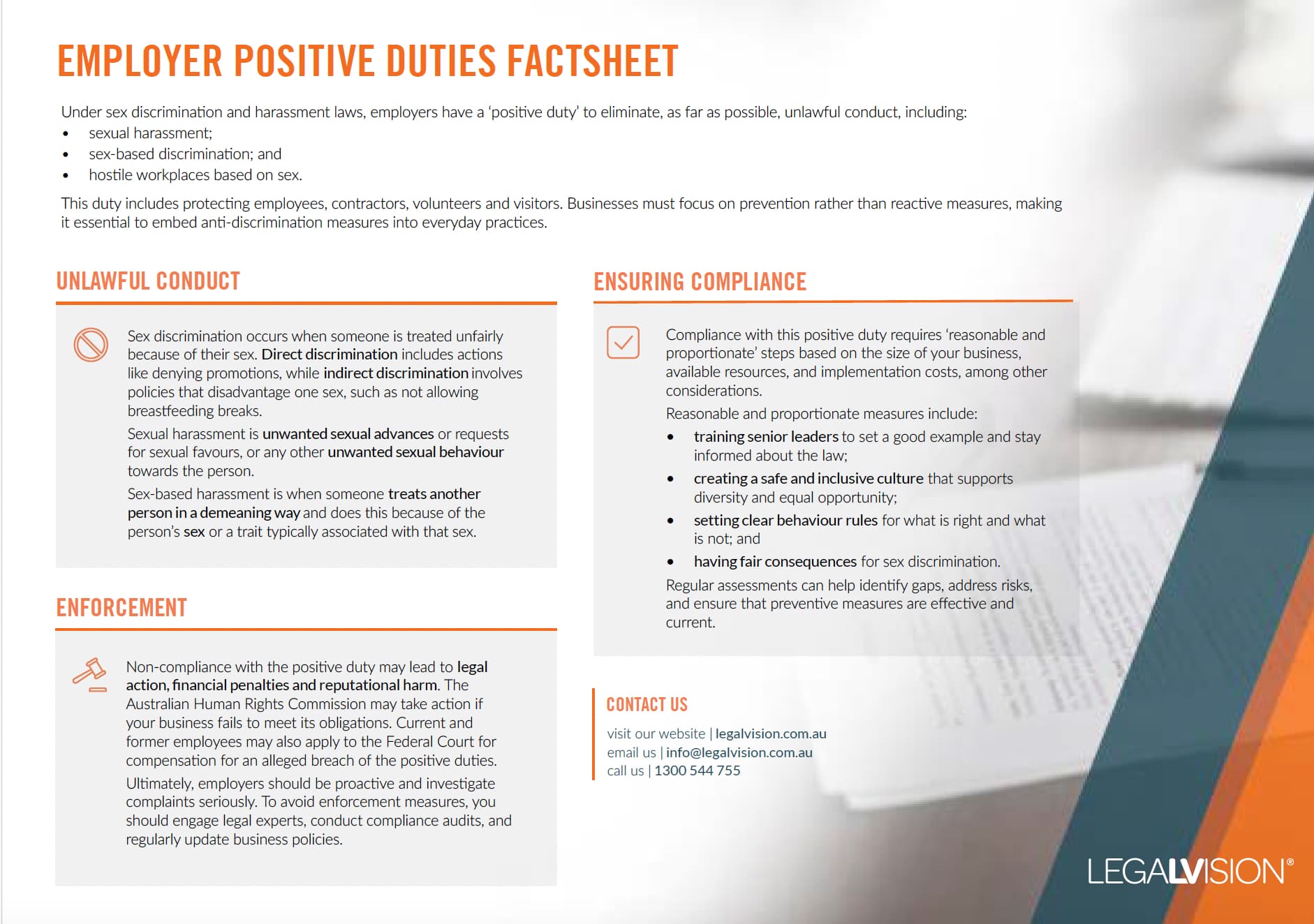In Short
-
Psychosocial hazards include stress, burnout, bullying, discrimination, harassment and isolation that can harm employee wellbeing.
-
Employers must address these hazards through policies, consultation, training and by studying how work design or management causes risks.
-
Senior management has a positive legal duty to proactively manage these risks. Failure to do so may lead to serious penalties.
Tips for Businesses
Begin by identifying psychosocial hazards, such as excessive workloads or inappropriate conduct. Develop clear policies, train your team, foster open consultation, and monitor changes in work patterns. Senior management should stay informed of WHS laws, respond swiftly to identified risks, and review measures regularly to safeguard employee wellbeing.
As an employer, when hiring workers, you must consider risks to their health and safety and ensure that they are working within a safe environment. Often, considerations of physical risks and hazards will be at the forefront of your mind. However, there have been ongoing changes in the law with the rise of non-physical risks to safety, otherwise known as psychosocial hazards. A psychosocial hazard may arise when an employee has experienced discrimination, bullying and harassment within the workplace, or is feeling burnt out or stressed.
Recent case law involving shortcomings in a mainstream television network’s safety practices and culture has highlighted the importance of keeping up to date with your ongoing obligations and how best to mitigate risks to avoid financial penalties.
What is a Psychosocial Hazard?
Psychosocial hazards may arise from workplace interactions or behaviours that can cause psychological and physical harm to a person. As an employer, you should be aware of and eliminate behaviour such as discrimination, bullying and harassment within the workplace. Psychosocial hazards may also arise when an individual displays:
- workplace fatigue;
- high stress; and
- burnout.
Obligations for Employers to Consider
The first step in ensuring compliance as an employer is remaining aware of your work health and safety obligations. These obligations extend to the business, its managers and its workers.
The Business
Your business must take reasonable steps to ensure the safety of your workers. While a business is not expected to eliminate each risk to safety that may arise, they are obligated to ensure that they take reasonable steps, including implementing:
- policies and procedures;
- consultation processes; and
- ongoing training on psychosocial hazards.
Officers (Senior Management)
Officers or Senior Management within the business have a duty to ensure due diligence, such as staying up to date with changes to WHS laws and an ongoing duty to ensure the business remains in compliance with their obligations. When officers have identified a psychosocial hazard within the business, they should exercise due diligence to address and control the risk.
For example, if a manager becomes aware that employees are consistently working excessive hours and reporting high-stress levels, they should take steps to identify the cause, consult with affected staff, implement control measures such as workload adjustments or additional resources, and monitor the situation to ensure the risk is reduced.
Workers
Workers must also take steps to ensure their safety and that of those around them. This may include:
- operating equipment and machinery safely and as directed;
- refraining from engaging in behaviour that is likely ot cause stress or harm to others in the workplace; and
- reporting behaviour such as bullying, harassment or discrimination that they witness in the workplace.
How to Mitigate Risks
You can take steps to mitigate risks that arise from psychosocial hazards in many ways. The list below is not exhaustive, but it provides some considerations you may take to reduce risk within your business.
Policies
Reasonable steps the business may take include the implementation of policies. Workplace policies should explicitly reference legal obligations to prevent inappropriate workplace behaviours. It was also recommended that clear messaging be directed to employees regarding their obligations to comply with such policies.
Your business should:
- use policies to set clear workplace standards and reduce business liability when they are appropriately enforced;
- ensure policies are easily accessible to all workers and communicated regularly;
- require workers to acknowledge in writing that they have read and understood the policy, and keep this acknowledgement on record; and
- provide training alongside policies to ensure they are understood and meaningfully enforced.
Policies that speak directly to psychosocial hazards can assist you in clearly communicating the business’s position on certain workplace behaviours, reporting structures and outcomes for contravention of the policy.
Consultation
You will need to consult, so far as is reasonably practical, with workers who are or are likely to be affected by a work health and safety matter. The consultation process allows workers to discuss and provide feedback on decision-making processes and can help you identify the severity of psychological risks within the workplace.
Training
When reviewing ways to mitigate psychosocial risks within the workplace, you should consider ongoing training for your workers. Training can reinforce and set the business’ expectations regarding how workers should conduct themselves. As an employer, you should regularly provide training and document attendance for record-keeping purposes.
Positive Duties Imposed on Employers
With the rise of psychosocial hazards and claims within the workplace, recent changes to the law have been introduced that impose positive duties on you, the employer.
A positive duty is a legal obligation to take proactive and meaningful action to prevent unlawful conduct in the workplace or in connection to work.
You must maintain and comply with relevant WHS laws as a duty holder, including in relation to psychosocial hazards. Where your business (or your officers and managers) breaches this obligation, significant penalties may apply. Penalties may include fines or, in some cases, imprisonment. You must be aware of your obligations and maintain compliance with WHS laws.

This fact sheet outlines employers’ ‘positive duty’ under sex discrimination laws, highlighting proactive measures to prevent unlawful conduct.
Key Takeaways
As an employer, you should be taking steps to identify and assess psychosocial risks within the workplace. You can control and mitigate these risks by consulting with your workers, implementing policies and maintaining ongoing training.
If you need WHS assistance, our experienced employment lawyers can assist as part of our LegalVision membership. For a low monthly fee, you will have unlimited access to lawyers to answer your questions and draft and review your documents. Call us today on 1300 544 755 or visit our membership page.
Frequently Asked Questions
Psychosocial hazards may arise within the workplace that have the potential to cause psychological or physical harm.
There are three key duty holders under WHS laws: the business, its officers (senior managers), and the workers themselves. Each duty holder has their duty to ensure safety within the workplace.
We appreciate your feedback – your submission has been successfully received.












